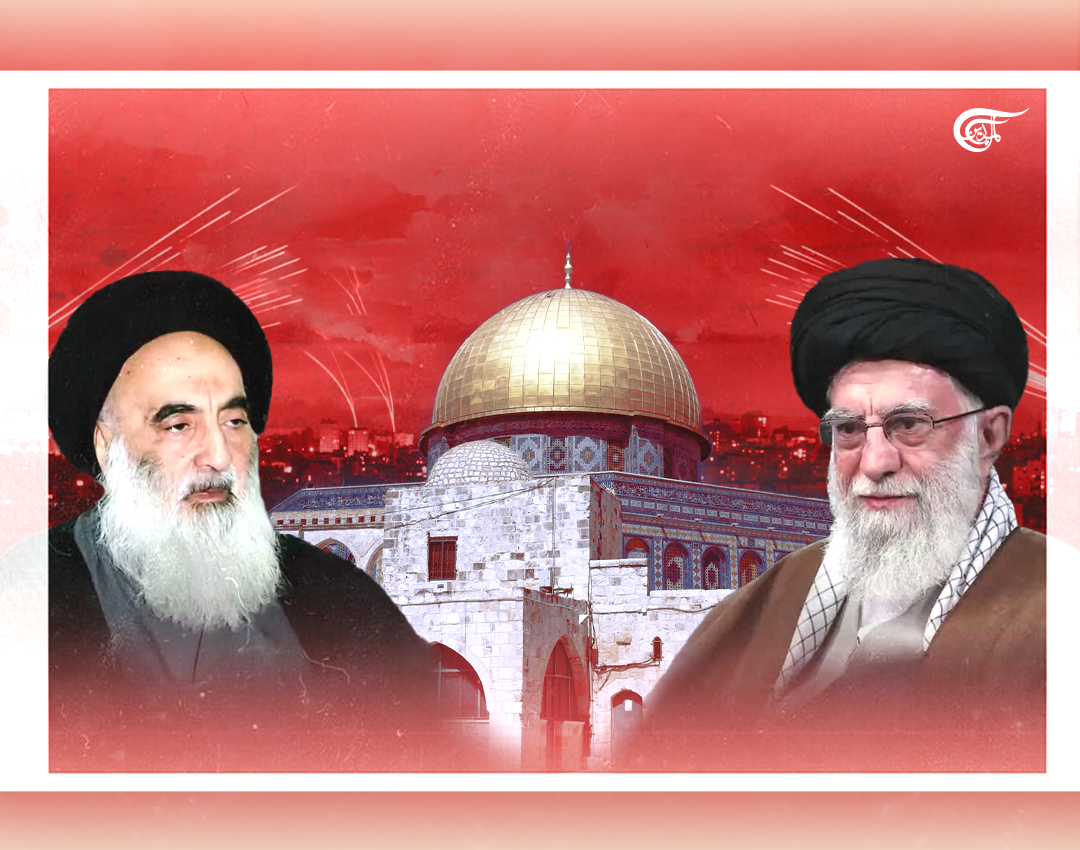One fatwa by the Shia clergy is all it takes to mobilize the world’s largest anti-Zionist force
With Gaza facing a very real existential threat, and with Al-Aqsa Mosque under constant violations by the Zionist fanatic settlers, we could very well witness a religious call to arms.
-

(illustrated by: Arwa Makki, Al Mayadeen English)
The two ideologies of Wahhabism and Zionism are both relatively modern ones, only 68 years separate the death of the founder of the former, Muhammad ibn Abd al-Wahhab with the birth of the latter, Theodor Herzl. Yet both religious fundamental ideologies have had destabilizing effects on West Asia and the wider region.
Wahhabism, which liberally advocates takfirism (excommunication) has not only been essential for the founding of the Saudi kingdom but also led to the emergence of many militant extremist groups, including Al-Qaeda and Daesh. In fact, as far as Daesh was concerned, "the Saudi state has deviated from the true beliefs of Muhammad ibn Abd al-Wahhab, and that they are the true representatives of the Salafi or Wahhabi message."
At its peak, the self-proclaimed caliphate of Daesh controlled about a third of Syria and 40 percent of Iraq, prompting the Najaf-based Grand Ayatollah Sayyed Ali al-Sistani to issue a fatwa (religious edict) in June 2014 to confront the looming threat to the capital and the important shrine cities which were on the radar of the Daesh to be destroyed, not too dissimilar to the Wahhabi sacking of Karbala in 1802.
Sistani’s fatwa, a call for defensive jihad was the first to be made in about a century by a marja (source of emulation) and urged Iraqi "Citizens to defend the country, its people, the honor of its citizens, and its sacred places," this was primarily aimed at the Shia masses, who follow his jurisprudential rulings, but not limited to them, and was heeded by Sunnis and other religious and ethnic minorities.
In a matter of days, hundreds of thousands of volunteers responded to the fatwa, and with the support of neighboring Iran, the Popular Mobilization Forces (PMF) was established as an effective fighting force against Daesh and remains an important part of the Axis of Resistance.
Although territorially defeated, the threat of Daesh though weakened still lingers. However, the threat posed by the "Israel" has been a persistent threat to the region, since its inception in 1948.
Yet despite decades of oppression of the Palestinian people, the occupation of Lebanese and Syrian territory, and the meddling in affairs of other states, "Israel" finds itself in its biggest challenge to date with the audacious resistance operation Al-Aqsa Flood, which has the propensity to develop into a multi-front war, consisting of other Axis members.
Just four days before the operation kicked off on 7 October, Iran’s Ayatollah Sayyed Ali Khamenei posted on X that “The Zionist regime is dying,” having maintained in 2015 that it won’t last 25 years.
Amid the ongoing resistance operation, it may seem that the aggressor holds the tactical advantage, owing to their overwhelming firepower. However, strategically, the tide appears to be shifting in favor of the Palestinians. This conflict has resulted in a historic number of Israeli fatalities and prisoners of war in just one week, revealing the fragility of "Israel's" ability to secure its realm and pointing toward a potential change in the status quo.
While it seems possible that Hezbollah and Syria will get involved in the operation – with potential support from the PMF, Yemen’s Ansarallah, and even the Islamic Republic, worth considering is the huge influence wielded by the Shia clerical establishment, particularly among Sistani and Khamenei.
Both clerics are among the most influential Muslim leaders in the world, in fact, Khamenei ranks number two with Sistani in 9th place on the Muslim 500 index, charting the most influential Muslims in the world. Together, along with other high-ranking Shia maraji, they hold immense clout over millions of Shia Muslims across the world.
At least in the modern era, close examples of this influence can be traced back to the late 19th century during the Shirazi Tobacco Protest in Iran. Grand Ayatollah Mirza Hasan Shirazi's fatwa against the tobacco concession granted to a British company was considered a turning point.
This united the people against foreign exploitation, and the protest succeeded in forcing the concession's cancellation, proving the efficacy of religious leadership in mobilizing the masses for political change.
A similar event unfolded in Iraq during the 1920 revolution against British colonial rule. Grand Ayatollah Mirza Muhammad Taqi al-Shirazi issued a fatwa calling on Iraqis to rise up and wage jihad against the foreign occupiers.
In light of the genocidal acts of aggression against Gaza, Sistani has issued a statement, though not quite a fatwa, calling on the world to stand up against the occupation state’s brutality, pointing out that only with the end of the occupation, will the Palestinian people attain their freedoms – he warned that should this not be realized, “the resistance will continue against aggressors.”
He was followed by another senior marja, Grand Ayatollah Bashir al-Najafi who called on “The honorable people of the world to stand firmly with the struggling Palestinian people, defending their natural rights to reclaim their usurped land." He also emphasized that eradicating this "cancerous tumor" was a collective effort of the believers.
In 2021, Sistani made a similar statement, urging “free nations to throw their weight behind them so that they will obtain their stolen rights.”
These statements allude to the importance of resistance and the need for a unified front against "Israel", with the call to arms a potential outcome should the situation continue to deteriorate.
The Shia marja relies on the principle of "enjoining good and forbidding wrong" as a religious obligation. This principle empowers them to issue fatwas when they perceive actions that contravene Islamic values or pose a threat to the Shia and the wider Muslim community at large.
With Gaza facing a very real existential threat, and with Al-Aqsa Mosque under constant violations by the Zionist fanatic settlers, we could very well witness a religious call to arms, much like Sistani’s fatwa to counter Daesh. As with every ruling issued by usuli scholars, though, there will be much deliberation and rationality applied to such an edict.
Clerics from other schools of thought are often constrained by political interests and state approval, which limits their ability to issue influential fatwas or mobilize the masses for resistance, especially if the country in question has normalized relations with "Israel".
The highest seat of Sunni learning, Egypt’s famed Al-Azhar for example also issued a statement, condemning the Zionist entity’s war crimes while calling on “Arab and Muslim countries to live up to their religious and historical duty and responsibilities, and to provide immediate humanitarian and relief aid, and ensure its safe delivery to the Palestinian people in the Gaza Strip.”
If the top Shia clerics believe that the oppression of the Palestinians and the desecration of the Al-Aqsa Mosque have reached a critical stage, posing a grave threat to the Muslim community, their religious authority might potentially lead to the issuance of a fatwa.
Should it be deemed necessary to defend this land, such a declaration could mobilize arguably the largest anti-Zionist infantry force in history, with the potential to play a historic role in the liberation of Palestine. In essence, we are just a fatwa away.

 Omar Ahmed
Omar Ahmed
 7 Min Read
7 Min Read







